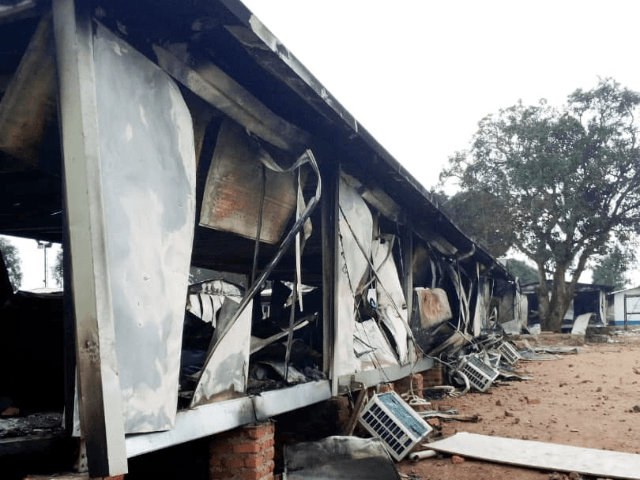Hundreds of enraged locals in Beni, North Kivu, Democratic Republic of Congo (DRC), burned down the city’s town hall on Monday and stormed a United Nations peacekeeping compound, destroying vehicles and key equipment.
The compound belonged to the United Nations Organization Stabilization Mission in the Democratic Republic of the Congo (MONUSCO). The United Nations is active in this region of eastern DRC due to the ongoing guerrilla warfare between dozens of rival groups seeking control of mineral resources. The fighting has plagued residents for years, who have contended with the second-worst Ebola outbreak in history for months amid the attacks.
Reports suggest the protesters began rioting in response to a deadly attack by one of the many armed militias in the area, the Allied Democratic Forces (ADF), late Sunday, resulting in eight deaths and nine missing, presumed abducted, according to Deutsche Welle. The crowd reportedly first organized outside of Mayor Nyonyi Bwanakawa’s office, demanding the UN leave the area as they had done nothing to stop the attack. The mob ultimately set the town hall on fire and moved on to the MONUSCO site.
“Several offices at the MONUSCO headquarters were set on fire and looted,” Teddy Kataliko, a civil society leader in Beni, told local media. “Residents are demanding the withdrawal of MONUSCO from Beni because of the inaction of UN forces.”
Estimates of the dead on Monday vary between two and eight people, shot by security forces attempting to quell the violence. That violence appears to have triggered further protests on Tuesday. According to the Congolese outlet Actualité, a crowd marched through the streets of Beni on Tuesday carrying the corpse of a dead protester and demanding MONUSCO leave indefinitely. The crowd appeared to be targeting Mayor Bwanakawa’s home, as his office had already been set on fire, but police fired live rounds to disperse the group.
Carly Nzanzu Kasivita, the governor of North Kivu province, imposed a curfew in Beni on Monday to prevent more violence. In the nation’s capital, Kinshasa, President Felix Tshisekedi announced that he would expedite operations to combat the ADF and empower MONUSCO to act in the face of more attacks. MONUSCO officials claimed that their only mandate is to aid the wounded and Congolese troops, not to attack in the event of a raid, triggering much of the outrage that led to the riots. Tshisekedi announced the Congolese armed forces would construct a new base near Beni to work more closely to the United Nations peacekeepers and not be stationed far enough from the sites of attack so as to be unable to offer a rapid response.
“MONUSCO is here … but to maintain order, the security of our people, that is first and foremost a task that falls under the sovereign responsibilities of the state,” Deputy Prime Minister of the Interior Gilbert Kankondé, on a visit to Beni on Monday, said. “The public must understand that the world is what it is today, and the U.N. forces have been here for many years, and supported us when we needed them.”
The U.N. entity also released a statement saying it “understands the frustration and anger” but lamented the riots “only weaken the fight against the ADF.”
The announcement did not stop protests from spreading elsewhere in North Kivu. On Tuesday, protesters also took to the streets of Butembo, another major city severely hurt by the ongoing Ebola outbreak. A group of youth protesters surrounded a United Nations base in the city and began attemping to assault employees within, prevented from entering the building by police tear gas.
“Gunshots were heard until noon in several corners of the city,” according to the Congolese outlet Radio Okapi. Protesters have also attempted to paralyze the city by erecting blockades on the city’s major roads.
“According to the mayor of the city Sylvain Kanyamanda,” the report continued, “this situation has paralyzed all activities in the city and the damage is very numerous.”
Beni last saw similar protests in August, when an estimated 5,000 people burned down buildings and created road blocks to demand the government do more to stop guerrilla attacks.
“Young people in Beni city decided to demonstrate. They threw stones on the avenues, burned tires in some neighbourhoods and called on the population to stop all work,” Kizito Bin Hangi, identified as a “civil society official,” told Radio France Internationale at the time. “Really, it’s not right, there are killings every day.”
North Kivu and neighboring Ituri provinces are the center of the fight against Ebola virus. Amid the chaos, medical centers in Butembo have largely failed to run properly. An Actualité report from last week denounced the Ministry of Health for allowing contractor companies to get away with not reimbursing hospitals for supplies, leaving them unequipped with the necessary medicine, and leaving them otherwise “dysfunctional.”
“For four months now, the bills of care have not been reimbursed and several health facilities have not been supplied with drugs,” Vake Okelo, coordinator of a Butembo health facility, told the outlet. “The patients risk receiving unsuitable care, because the patients are presenting themselves in structures, the caregivers notice the problem, but do not know what to do because they have no more drugs.”
The publication noted that Butembo health facilities were also overwhelmed by patients following the government’s declaration a year ago that all residents would receive completely free health care in an attempt to ensure that all Ebola patients were found and contained.
These interviews occurred days after health workers at Ebola centers in Butembo ended an extended strike demanding their pay, which they had not received.
The World Health Organization declared the Ebola outbreak in DRC an international emergency in July. It is currently the second-largest outbreak in history on record. As of Tuesday, medical professionals have documented 3,303 cases of Ebola in the outbreak and 2,198 deaths.

COMMENTS
Please let us know if you're having issues with commenting.